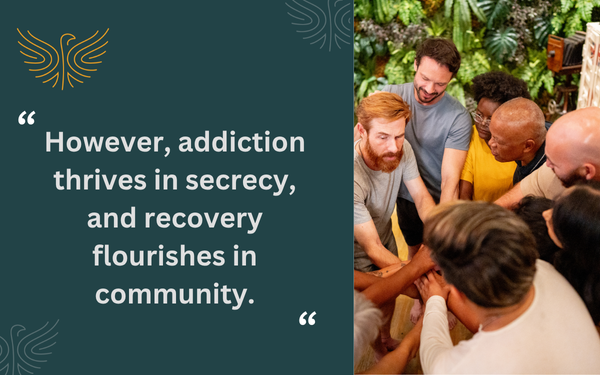Early sobriety is a vulnerable stage where small missteps can derail progress. Yet, recognizing common mistakes can help individuals and their loved ones avoid setbacks and build a stronger foundation for lasting recovery. So, which ones should you watch out for?
Common Mistakes in Early Sobriety
It’s worth noting that knowing these pitfalls won’t guarantee you’ll avoid them, but being aware gives you the power to course-correct before small mistakes become major setbacks. So, let’s take a closer look; what mistakes should you know?
Trying to Do It Alone
One of the most dangerous mistakes people make in early recovery is attempting to navigate sobriety in isolation. After spending months or years hiding addiction from others, it can feel natural to approach recovery the same way—privately and independently. However, addiction thrives in secrecy, and recovery flourishes in community.

Many people resist support groups, therapy, or leaning on loved ones because they fear judgment, don’t want to burden others, or believe they should be strong enough to handle it themselves. This mindset overlooks the fact that addiction is not a moral failing that requires solitary punishment, but a complex condition that responds best to connection and support.
Support groups, such as Alcoholics Anonymous or SMART Recovery, provide more than just accountability—they offer hope through shared experience. Hearing others speak openly about their struggles reminds you that you’re not uniquely broken or beyond help.
At the same time, professional support matters, too. Therapists, counselors, and addiction specialists bring expertise that friends and family, no matter how well-meaning, simply cannot provide. They help you understand the underlying causes of addiction, develop healthy coping mechanisms, and navigate the emotional turbulence of early sobriety.
Replacing One Addiction with Another
When someone stops using drugs or alcohol, the brain doesn’t immediately forget what it learned during active addiction. The neural pathways that drove compulsive substance use are still there, searching for new outlets. Without awareness, it’s easy to transfer addictive behaviors to something else.
Some common replacements include:
- Shopping
- Working more
- Exercising compulsively
- Gaming
- Partaking in risky sexual behaviors
- Gambling
While these activities may seem less dangerous than drug use, they serve the same function—numbing difficult emotions and avoiding the hard work of genuine healing.
But what makes replacement addictions particularly tricky to spot is that some behaviors—like exercise or work—are generally healthy. The difference lies in the motivation and the consequences. Are you running to support your recovery? Or are you running from your feelings? Is your work ethic admirable? Or are you avoiding going home and sitting with yourself and your feelings?
Neglecting Mental Health
Many discover in early sobriety that they were self-medicating anxiety, depression, trauma, or other conditions. When substances are gone, these issues often reappear, sometimes more intensely than before.
Yet, some resist therapy, believing sobriety alone should be enough, or dismiss their symptoms—like persistent sadness, panic, or numbness—as “normal.” But ignoring mental health increases relapse risk and makes recovery even harder. In reality, addressing any mental health issues is central to your recovery. It can also help prevent relapse and pave the way toward healthier coping mechanisms.
Unrealistic Expectations
Early sobriety often comes with the hope of instant change—restored relationships, career success, and inner peace. When reality doesn’t match, frustration can fuel relapse.
The truth is that recovery takes time. Trust rebuilds slowly, finances stabilize with steady effort, and self-acceptance grows through both setbacks and progress. Holding yourself to impossible standards only leads to shame when cravings or hard days appear, which are normal parts of the process.
It’s also unrealistic to expect loved ones to immediately forgive or forget. They need their own healing, and trust is earned through consistent action, not quick promises. Progress is measured in small wins—choosing a meeting over isolation, facing a trigger without using, or simply waking up sober. These are the real milestones of recovery.
Avoiding Structure
Without addiction’s pull, sobriety can feel empty. And unstructured time often invites relapse. Many avoid building structure, fearing it will feel restrictive, but drifting through days without direction quickly becomes overwhelming.
Yet, structure doesn’t mean rigid schedules; it means supportive routines—regular sleep, planned meals, meetings, exercise, or meaningful activities. Accountability helps too, whether from a sponsor, therapist, or sober friend who notices when you’re slipping.
It also means removing triggers, such as avoiding old routes, deleting contacts, or staying away from environments where substances are present.
Overall, recovery isn’t about perfection but progress; awareness of the above common mistakes makes relapse less likely. By seeking support, addressing mental health, setting realistic expectations, and building a healthy structure, early sobriety becomes not just survivable but a genuine opportunity for transformation.
Are you or someone you love struggling? Freedom Recovery Centers (FRC) is here to help. We’ll walk with you every step of the way! Call us at 804-635-3746 to learn more.
.svg)






.svg)

.svg)



.svg)
